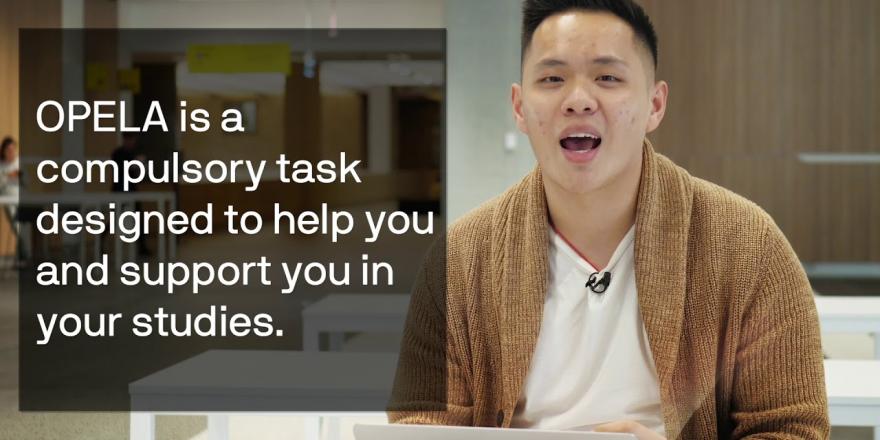OPELA is an online activity designed to give you some feedback on your current academic language skills. Academic language skills are essential for you to successfully engage in your studies and achieve your educational and career goals.

Hi I'm Aaron and I'm Hebah.
We've both been studying here at UTS for a while now, and I think we can both agree, that in terms of doing your studies, the development of your academic language skills is very important.
What is academic language? Academic language means the language, readings and ways of communicating within a discipline. That means that every discipline has its own academic language that you need to be able to use in your studies. And that's exactly where OPELA comes in.
So what is OPELA? OPELA is a compulsory task designed to help you and support you in your studies. It's not a test, it's a task to work out if UTS can provide extra support that may help you. OPELA gives a snapshot of your academic language level as a first step in advancing your academic skills at UTS. Academic language skills are used in all forms of communication at University. As you now, these skills are crucial for academic success as well as for employment opportunities. You would have developed some skills in high school or through other educational pathways, however, it's important that you continue to develop these language skills here while at university. The OPELA task takes about 30 minutes to complete but it is recommended that you allow 40 minutes to complete OPELA from beginning to end. The task has two sections, the text completion and the speed reading. Each section is timed. OPELA is designed for a variety of different types of students, so don't feel pressured about the time limit. It's okay if you don't have time to finish each section. What do you need before you start OPELA? Depending on what you study, you might be asked to complete OPELA in a lab, on campus or you might be asked to complete it in your own time. It is best to find a quiet space with no interruptions and a good internet connection. Also it's recommended that you do OPELA on a computer or a laptop. Do not use your mobile phone to do OPELA. Once you've completed OPELA, you'll receive feedback on your academic language level. Depending on the level you receive, you may be required to complete additional compulsory language development tutorials. These tutorials are designed to improve your academic language skills. You'll get more information about these tutorials when you get your result. So in summary, UTS offers support for your academic language development. Look forward to completing OPELA. It's a great way to find out what kind of support is good for you.
OPELA - Online Post-Enrolment Language Assessment
At UTS, all commencing students must complete the Online Post-Enrolment Language Assessment (OPELA) in the first two weeks of their commencing session. Information about the OPELA task is made available to you during orientation week and communicated to you in your first class.
The purpose of the OPELA task is to give you an indication of your academic language skills. Academic language skills are an essential foundation for learning and ongoing language development at university, especially discipline-specific language and professional communication. Awareness of your academic language skills will enable you to understand and address your language development need by accessing language support resources and services.
OPELA will be available to students from orientation weeks and is accessible from their Canvas dashboard.
Go to Canvas to complete OPELA
Frequently asked questions (FAQs)
Are you a UTS Online student? Please see FAQs for Post-Grad UTS Online students for information about your course delivery mode.
Why do I need to complete OPELA?
The English Language Policy (the policy) sets out the framework for English language proficiency requirements and support at UTS. This is in addition to the Admissions and Recognition of Prior Learning Policy, which outlines the English language admissions standards. OPELA helps identify students who need help to develop their academic language to ensure that students meet the English language proficiency requirements for their course.
All students are required to complete an online post-enrolment language screening task. You may think that your academic language is sufficient for university study. However, we still require you to complete OPELA. It is only by screening all students that we can identify those who need language support. By completing OPELA you are helping us provide academic language and literacy support to students who may need it.
When is OPELA available to students?
OPELA is available to students from orientation week. Students can access OPELA from their Canvas dashboard.
Do I need to prepare for OPELA?
No, you do not need to prepare for OPELA. OPELA is not a test, there are no preparation materials aside from the short practice exercises before each component of the OPELA task.
My first language is English. Do I still have to do OPELA?
Yes, you still have to do OPELA. OPELA focuses on your level of Academic English language, not your level of everyday English language.
Is my OPELA “result” included in my academic record?
No, OPELA provides a form of feedback for you to use rather than a “result”. Your OPELA information is not included in your academic record and will not appear on your official Academic Transcript or your Australian Higher Education Graduation Statement (AHEGS).
What happens once I have completed OPELA?
Your result and feedback will be available to you at My Student Admin within 24 hours of completing OPELA. If your result from OPELA is 'Basic Proficiency', you will be invited to attend Language Development tutorials. Your feedback will provide you with information on how to start attending Language Development tutorials.
What does the feedback I receive mean?
The feedback provides you with a snapshot of your current academic proficiency as follows:
Basic Proficiency: Your result suggests that you will need to spend a significant amount of time improving your Academic English throughout your degree. You will be invited to attend Language Development Tutorials every week starting from week 4 of the teaching session and are free to attend.
Intermediate proficiency: While it is likely you will be able to meet the demands of your course, you should further develop your language skills by accessing the language development activities, resources, and services that are available. UTS HELPS is a great resource for students, and we highly recommend contacting them to assist with your studies.
Good proficiency: You have good foundations in academic language for university study. However, you should continue to develop your language skills during your course.
What happens if I do not complete the OPELA task?
You are required to complete OPELA before the end of your first session. If you do not complete OPELA before the results release date a sanction will be applied preventing access to your results in My Student Admin.
The OPELA sanction prevents access to the following records:
Your subject results and academic records are withheld until you have completed OPELA.
Prevent access to an official transcript issued by the University.
To remove the sanction, complete OPELA and contact us at OPELA@uts.edu.au
I have a disability which means I may not be able to undertake OPELA, or it may impact my OPELA result. What should I do?
Please register with the UTS Accessibility Service. Accessibility Services will then be able to refer students to the appropriate alternative arrangements.
What happens if I do not attend the Language Development Tutorials?
You are missing out on an opportunity to learn new academic literacy skills and possibly improve your grade. Attending LDTs are not compulsory. However, our research shows us that students who complete these LDTs usually receive better grades.
How can I remove my OPELA sanction?
To remove the sanction, complete OPELA and contact us at OPELA@uts.edu.au
What other language support and resources are available to me?
UTS offers free academic and English language workshops as well as subject-specific programs, such as UPASS, to all current students. These are run by the Higher Education Language and Presentation Support (HELPS) team who can assist you by providing individual, peer-assisted and group support in a friendly and respectful environment.
HELPS services are highly recommended regardless of what proficiency you receive from OPELA. Visit HELPS for more information.
The UTS Library is also an excellent source of support and resources to help you with your studies.
Contact Us
If you have a question that is not addressed above, please contact opela@uts.edu.au.


